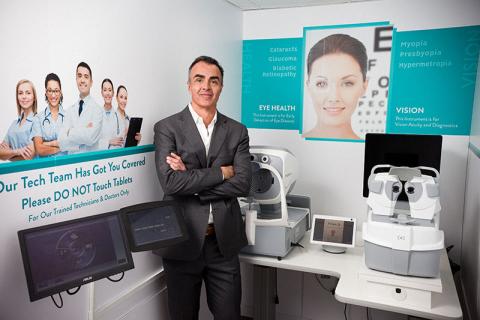Visionary Leadership: Alum hopes to transform optical services for marginalized communities

Millions of Americans routinely forgo routine vision care due to the cost and inconvenience, sacrificing quality of life and putting themselves at serious risk.
Jesse Devlyn (MBA ’93) has a solution: Vision kiosks in grocery and department stores that utilize remote technicians to provide automated eye exams and prescription services at a significant discount compared to traditional optometrist shops.
“Setting up an optometry practice is very expensive, and the most expensive part is the staff,” explains Devlyn. “Our equipment is all remote, so one technician can support five kiosks, and one doctor can review the clinical data from 10 kiosks. That brings the costs down substantially, and we’re able to really offer glasses at very affordable prices.”
Devlyn is CEO of Zoom Vision, which hopes to transform optometry in the U.S. by providing affordable, on-demand vision care to underserved populations, including the country’s large Hispanic community.
Devlyn is no stranger to the vision care business. He is also CEO of Devlyn Optical, the family business that has been a leading provider of vision care services in Latin America for more than 80 years.
His grandfather founded the company in El Paso, Texas, in 1936 after relocating from Chicago. Although not an optometrist, Frank Devlyn eventually opened four successful optical shops in the city. When the Federal Trade Commission established a new rule requiring prescription eyeglasses to be sold only by licensed optometrists, he moved the business across the border to Juarez, Mexico, where glasses could be sold without an optometrist’s prescription.
The family business flourished in Mexico, becoming one of Latin America’s largest optical retailers with over 880 retail locations in Mexico, Guatemala and El Salvador as well as the U.S. The majority of its stores are located in the largest and busiest shopping malls in Mexico as well as inside or near supermarkets and department stores such as Walmart, Sears and HEB. Devlyn Optical also operated optical services in more than 30 CVS stores in the U.S. before selling that operation in 2019.
A native of Mexico City, Devlyn joined the family business in 2006 after working in corporate finance and starting a number of businesses, including a financial news service that was eventually acquired by Internet Securities.
“When I first graduated from college, my dad said, ‘You need to go and prove yourself elsewhere, not here in the family business,’” Devlyn recalls. “By that time, after I’d started a few companies, my dad said, ‘Just come back to the business. I know you like entrepreneurial things. You can do entrepreneurial things for us.’”
Since launching Zoom Vision in 2020, Devlyn has overseen the development of proprietary software that enables it to automate optometry services and drive down costs.
“With Zoom Vision, we can do eye exams without having a doctor present at the location,” Devlyn says. “It’s all via done telemedicine, and not only in a remote way but in an asynchronous way. That means that we capture the clinical data at the kiosk and upload it to the cloud, where a doctor can later review it and issue a prescription so we can order glasses for the patient.”
Zoom Vision is currently operating a kiosk at a Mi Tienda supermarket in Houston, which serves a large Spanish-speaking population.
“There are 60 million Hispanics in the U.S. who have the purchasing power of the 7th largest economy in the world, and they’re totally underserved because the business model of buying prescription glasses here just does not fit their lives," Devlyn says. "They generally don’t have vision insurance, they don’t have paid time off, and they don’t have time to wait for an appointment.”
Zoom Vision meets their needs with affordable eye exams and prescription glasses that don't require insurance, office visit or appointments. Devlyn says they're still working out the kinks, but the initial response to the kiosks has been encouraging.
“We’re doing really well,” he says. “Once we finetune all the backend components of the software, our plan is to roll out more kiosks and have a good network to address the gap we see in basic vision care. It’s really exciting.”
Interested in advancing your education and/or career? Learn more about Freeman’s MBA programs. Find the right program for you.
Recommended Reading
- Online vs. In-Person MBA: Benefits and Differences
- How to Stay Focused and Apply for an MBA
- How to Choose an MBA Concentration
- What Will You Learn in an MBA Curriculum?
- Part-Time vs. Full-Time MBA
- What Is a Professional MBA? Overview and Career Outcomes
- What Are Dual Master’s Degree Programs?
- Can I Get a Scholarship or Fellowship for Graduate School?
Other Related Articles
- NOLA.com: Louisiana venture capital firms, once an afterthought, are big funders of local startups now
- Keeping it cool: MBAs help Convention Center find its temperature sweet spot
- Forbes: Your Pitch Deck Doesn’t Close the Deal - Your Power in the Room Does
- New Orleans startups bet on AI as Tulane expands its survey statewide in 2026
- Freeman Futurist Series looks at AI, Robotics and Quantum
- Louisiana’s economic momentum takes center stage at 46th Tulane Business Forum
- Every dog has its day at alums’ bar and restaurant
- Embracing Business Futurism: A Conversation with Cliff Farrah
